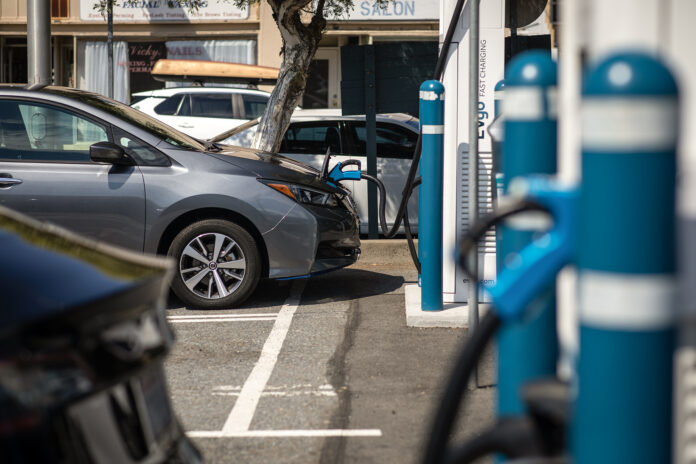The Supreme Court justices agreed to review whether oil companies have standing to try to overturn a federal waiver for a California clean-car rule that ramped up electric car sales. The standards are the cornerstone of California’s efforts to clean its air and combat climate change.
Welcome to CalMatters, the only nonprofit newsroom devoted solely to covering issues that affect all Californians. Sign up for WhatMatters to receive the latest news and commentary on the most important issues in the Golden State.
The U.S. Supreme Court announced today that it will review whether the oil industry has the standing to try to overturn a decision that allowed California to set its own limits on pollution emitted by automobiles.
The case filed by oil companies, other fuel producers and 17 other states argued that the federal government exceeded its authority under the Clean Air Act when it granted California a waiver to set its own tougher auto emissions standards.
The Supreme Court agreed to only examine whether the fuel companies that appealed a lower court ruling have the standing to sue. Oil and other fuel companies are not regulated under the California standards; only automakers are.
The justices rejected the fuel industry’s request to consider whether it was unlawful for the Biden administration to grant California the federal waiver.
“Congress did not give California special authority to regulate greenhouse gases, mandate electric vehicles or ban new gas car sales — all of which the state is attempting to do through its intentional misreading of statute,” Chet Thompson, president of the American Fuel & Petrochemical Manufacturers, said in a statement. The group was one of the parties seeking a Supreme Court decision. “We look forward to our day in court.”
Officials from the state Air Resources Board declined to comment.
Under a clean air law enacted by Congress in 1967, California has the power to enforce its own tougher standards for vehicle emissions. Congress gave California this unique privilege because it regulated emissions before the law’s passage. Other states can adopt California’s stricter policies, but cannot set their own.
California’s unique ability to set its own course under the Clean Air Act has been the keystone for all of the state’s efforts to clean its air. It’s a major reason why the state has been able to markedly improve its air pollution over the past half century, though much of the state still has some of the nation’s worst smog and soot.
WeeklyMatters
WeeklyMatters
Catch up on the top stories in California with a summary of our reporting and commentary.
Catch up on the top stories in California with a summary of our reporting and commentary.
The case stems from a dispute from the prior Trump administration, which in 2019 revoked a waiver that the Obama administration granted for California’s 2012 zero-emission car mandate. The Biden administration reinstated the waiver in 2022, and oil companies and Republican-led states sued the Environmental Protection Agency.
The lower court, the U.S. Court of Appeals for the District of Columbia Circuit, ruled in April in favor of the EPA. The oil industry, other fuel producers and 17 states appealed the case to the Supreme Court earlier this year.
Automakers, environmentalists and other states, including New York, intervened in the case on the behalf of the EPA and the state of California.
The regulation, known as California’s Advanced Clean Cars I, cut greenhouse gas emissions and smog-causing pollutants by increasing zero- and low-emission vehicle sales requirements for model years 2015 through 2025. The air board ramped up those rules in 2022 to require all new cars to have zero emissions by 2035.
The case comes at a complicated time for the state’s efforts to combat climate change and air pollution. Each of California’s emission standards must be granted a waiver from the U.S. Environmental Protection Agency before it can take effect.
The EPA has not yet approved waivers for eight of California’s standards, including its landmark zero-emission car rule. Others require cleaner trucks, locomotives, commercial ships and off-road diesel vehicles like tractors and construction equipment. The most controversial one mandates zero-emission trucks.
President-elect Donald J. Trump’s EPA is expected to deny or try to revoke all of the waivers that California is seeking to enforce its clean air standards.
But Congress wrote explicit provisions in federal law about when EPA can reject them: The federal agency can only reject California mandates if they are “arbitrary or capricious,” if the state doesn’t need them to clean its severe air pollution, or if they are inconsistent with federal law because there is “inadequate lead time” for manufacturers to develop electric cars or other technologies at a reasonable cost.
.wp-block-group__inner-container > :not(h2){margin: 16px 40px !important;}.cm-cta.long-ask .wp-block-group .wp-block-group__inner-container{display: flex;gap: 12px;align-items: center;}.cm-cta.long-ask figure{max-width: 40px;flex-shrink: 0;}.cm-cta.long-ask .wp-block-group p{font-size: 18px;font-weight: 700;line-height: 120%;letter-spacing: -0.36px;width: 100%;}.cm-cta.long-ask .wp-block-group .wp-block-buttons{flex-shrink: 0;}.cm-cta.long-ask .wp-block-button__link{padding-left: 40px;padding-right: 40px;}@container long-ask (min-width: 601px){.cm-cta.long-ask *{font-size: 16px;}}@container long-ask (max-width: 600px){.cm-cta.long-ask h2,.cm-cta.long-ask .wp-block-group p{text-align: center;}.cm-cta.long-ask h2{background: linear-gradient(90deg,#FFB500 0%,#FFE094 50%,#FFB500 100%);padding: 12px 20px;font-size: 20px;letter-spacing: -0.4px;}.cm-cta.long-ask .wp-block-group .wp-block-group__inner-container{flex-direction: column;}.cm-cta.long-ask > .wp-block-group__inner-container > :not(h2){margin: 16px 20px !important;}}))>
We’re CalMatters, your nonprofit and nonpartisan news guide.
Our journalists are here to empower you and our mission continues to be essential.
We are independent and nonpartisan. Our trustworthy journalism is free from partisan politics, free from corporate influence and actually free for all Californians.
We are focused on California issues. From the environment to homelessness, economy and more, we publish the unfettered truth to keep you informed.
We hold people in power accountable. We probe and reveal the actions and inactions of powerful people and institutions, and the consequences that follow.
But we can’t keep doing this without support from readers like you. Plus, right now in our year-end drive donations are tripled to triple-your-impact.
Please give what you can today. Every gift helps.


